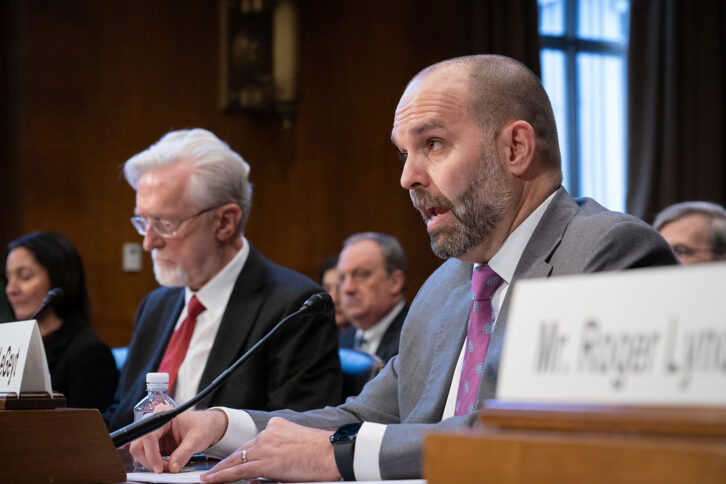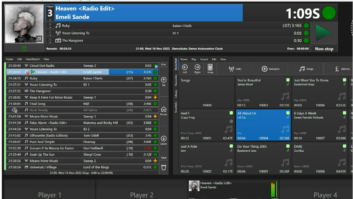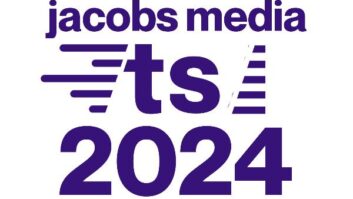This story is excerpted from the Radio World ebook “Artificial Intelligence in Radio.” Here, we spoke with business leaders and industry experts about the broad-brush potential impact of AI on the industry.
Many radio people believe generative AI will have a transformative influence on the broadcast industry in an increasingly digital and data-driven world. The National Association of Broadcasters calls AI the “newest tech superpower,” and many radio broadcasters are eager to explore AI while remaining wary of potential pitfalls.
Just how impactful might generative AI be on the radio industry? Bob Kernan, COO of jācapps, the mobile app development company, channels his inner Oppenheimer, likening AI to splitting the atom: “You can create enormous energy, or you can blow stuff up.”
Look for more AI to be plugged into multiple radio stacks. Disruptive tools like Open AI’s ChatGPT have made waves in creative industries including radio. Broadcasters are gaining a better understanding of applications: spec spots in minutes, smoother automation, synthetic voices, creation of copy, improved operational efficiencies, deeper brainstorming capabilities and inventive new experiences for listeners.
But the radio industry is also asking itself a lot of questions such as the possible impact on jobs, how to protect copyrighted material and whether to identify generative AI content on the air. Many executives agree that radio needs some guardrails and guiding principles; but what does that landscape look like, and does it involve some level of regulation?
There also are ethical implications to using the technology, and broadcasters are considering the ramifications. Deepfakes like the AI-generated explicit images purporting to be of Taylor Swift involve visuals but raise concerns among people who work in audio as well. Many experts believe abusive uses of AI will only grow worse.
Broadcast CEOs and radio programmers talked to Radio World about how the industry is evaluating AI and the next steps some are taking to adopt it.
Promise of transformation
Caroline Beasley, CEO of Bealey Media Group, said AI has the potential to be a game-changer in the broadcast industry. She said AI can help to personalize content, automate repetitive tasks and improve the overall quality of content and sales presentations as well as assist broadcasters in identifying new revenue streams and monetizing their content more effectively.
“The excitement around this technology stems from its ability to transform the industry and create new opportunities and efficiencies for broadcasters,” Beasley said.
Beasley Media has been working with Waymark to roll out the company’s generative AI technology to generate video for advertisers. It also is testing and considering Futuri’s Audio AI and Benztown’s Spec AI for the creation of spec radio spots, production and other on-air content. In addition, it is using AI plugins to assist with its digital content operations, she said.
“AI also can help the sales process by identifying new customers, improving outreach, customizing sales decks and increasing our speed to market,” she said.
The company, which owns 61 radio stations in mostly large and medium markets, is still developing policies to manage AI, Beasley said.
Audacy officials confirmed to Radio World “there is experimentation and discovery happening with AI” at the company, but said its long-term game plan is still evolving.
Jeff Sottolano, EVP of programming for Audacy, said undoubtedly there will be applications for AI that haven’t even been considered yet.
“That will be determined through democratizing access to these tools. Cultivating an environment where people feel excited about the possibility, rather than threatened by the future, will be crucial to discovering the applications we haven’t even begun to think about.”
He said AI is already being integrated into many of Audacy’s tools such as Salesforce and its music scheduling platform.
“Ultimately, I think for us it’s more about how we can leverage AI to make our creators’ lives easier so they can continue to deliver more of the premium audio content our consumers love and expect,” he said.
Lew Dickey, chairman of Modern Luxury Media, expects generative AI to have a profound impact on media over the next 10 years.
“It will be a transformative technology. The greatest since the advent of the internet,” said Dickey, the co-founder and former CEO of Cumulus Media.
He believes AI has the potential to increase productivity meaningfully across most if not all functional areas of the business, including content, sales, marketing, finance, traffic, technical and administrative.
“For media companies, AI will help create a closer relationship with audiences through more relevant content and more frequent touchpoints,” he said.
“Importantly, it will also speed the shift towards the modern media model, which emphasizes content to commerce as brands increasingly look for the media spend to activate consumers.”
The speed and efficacy of this transition will depend upon the amount of resources dedicated to application development by both media companies and third-party developers, in his view.
“Media organizations will need to evolve with technology in order to remain competitive,” Dickey said. He also expects many legacy broadcast positions will become obsolete while new jobs will be created to manage and optimize the potential of the new applications.
However, while media companies should understand and embrace this transformative technology, “I would advise caution and prudence, as the earliest adopters often bear the brunt of the pain as the various use-cases are proven out.”
The radio industry doesn’t have to look far to find competitors embracing AI. Spotify quickly jumped into the world of AI last year by rolling out a generative AI radio DJ, and SiriusXM this winter launched an AI-generated co-host for a show hosted by will.i.am of the Black Eyed Peas.
[Read More Radio World Stories About Artificial Intelligence]
Podcasting and “backend” tasks
Several experts told us they expect AI technology to be a major time-saver for broadcasters. They imagine AI taking a radio station’s on-air content, like a morning show, and quickly creating podcasts and other online audio material for websites.
In an interview with The Hollywood Reporter, Conal Byrne, CEO of iHeartMedia Digital Audio Group, said the audio company is looking to use AI to translate, transcribe and voice content for its podcast archives. It’s currently testing the technology.
He said iHeartMedia, the largest podcast publisher, expects to roll out the AI technology in the second half of 2024. “It’s not just a meaningful way for the creators to be able to access audiences in the language they want, but also to actually build businesses in those territories,” Byrne told the magazine.
Townsquare Media CEO Bill Wilson told the website Channelchek last year that the company was already using AI for backend engineering and technology tasks. At the time Wilson said Townsquare was also using it for writing computer code.
“This is the area I’m most excited about,” he told Channelchek. “AI is on everyone’s mind. The implications are still not well known, but I look for this is going to be like the industrial revolution. This is going to be such a dramatic change for all businesses. Really profound.
“For Townsquare, I have no doubt that it’s going to create scalability, efficiency and so many opportunities for us to continue our digital growth and transformation,” Wilson said in the interview.
The use of artificial intelligence for products, services and innovations is certainly sparking policy discussion at radio companies across the United States.
In Washington, several bills in Congress would put limits on AI and ultimately affect radio, including placing restrictions on using AI and deepfake technology to create political ads that could mislead listeners.
Experts say there also are legal questions galore about who owns what when it comes to content created by generative AI, and how broadcasters will protect their own content, much of which will likely be settled in the courts.
NAB President/CEO Curtis LeGeyt, testifying in January on Capitol Hill, said he worries about radio and TV personalities having their credibility undermined by rogue AI that manipulates their likeness or voice. Yet he understands how AI has captivated the industry.
LeGeyt, addressing the Senate Judiciary Committee’s Subcommittee on Privacy, Technology and the Law, said AI’s potential, including its impact on broadcasters, is just starting to be recognized, including in newsrooms.
“(AI) can help a radio newsroom generate better stories to serve diverse audiences,” LeGeyt said. Yet “the rising prevalence of deepfakes make it increasingly burdensome for both our newsrooms and users to identify and distinguish legitimate, copyrighted broadcast content, from the unvetted and potentially inaccurate content being generated by AI.”

The second inning
Transparency is another question mark for the industry. To what lengths should broadcasters go to know let listeners know the difference between generative AI and the human self?
“I worry broadcasters will be eager to use AI voiceover in radio, for commercials and imaging, but will broadcasters try to fool listeners or be forthcoming about how they use artificial intelligence? Ultimately, the FCC may have to weigh in on this,” said Fred Jacobs, president of Jacobs Media.
He said some radio companies will likely avoid the use of AI until much of this is sorted out.
“That may prove to be a mistake if they don’t make it a point to use this moment as an opportunity to learn and test drive the technology. It is simply unacceptable for broadcasters to get caught flat-footed by AI, or late to the party,” Jacobs said.
Given that it’s just the “second inning” for AI, according to Jacobs, the industry hasn’t witnessed anything near its full capabilities.
“Radio is going to have to innovate to remain competitive, but it’s essential broadcasters don’t just jump into the fray without a better understanding of what they’re getting themselves into. And I can’t stress this enough. Radio broadcasters will need to train staff on how to use it.”
Jacobs said he explains AI’s presence this way: “How and where (AI) shows up can be illusory. It’s hard to see sometimes. As attendees at CES the last few years know, AI isn’t a gadget or an exhibit. It’s part of the oxygen, the foundation of so much technology today, whether it’s on the content or marketing fronts. It’s going to be in the DNA of many products and services going forward.”
AI advocates see quickly expanding AI opportunities for radio, similar to efforts by Alpha Media in Portland, Ore., which launched AI Ashley, an artificially cloned voice, on KBFF(FM).
Despite high-profile applications like that KBFF experiment, AI mostly is expected to allow broadcasters to increase productivity and possibly cut costs.
“It’ll cut through much of the drudge radio work we see today,” one expert told Radio World. “The litmus test will be whether AI simply results in job losses and cutbacks or true innovation.”
Talk with your audience
According to a survey by McKinsey & Co., a global management consulting company, businesses that strategically implement artificial intelligence can experience a 20% increase in operational efficiency and a 10 to 15% reduction in overall costs. Furthermore, companies leveraging AI for customer insights and personalization have witnessed a 25 to 30% improvement in customer satisfaction and loyalty.
Buzz Knight, president of Buzz Knight Media and former programmer at Greater Media, said AI will help broadcasters enhance their operations, improve content creation and optimize audience engagement.
The consultant sees uses for AI in quality control, predictive analytics, audience analytics and even chatbots online.
“Radio stations could implement AI-powered chatbots on websites or on social media platforms for immediate listener interaction. These chatbots can answer questions, provide information regarding upcoming shows, and even take song requests. They would enhance engagement and provide a 24/7 point of contact for listeners,” he said.
Knight cautions broadcasters to embrace a guiding principle of maintaining “a human touch to ensure quality is at its highest level.” He suggests radio broadcasters move forward with AI by taking a “beginner’s mindset as you would when you have a new tool in the toolbox.”
Small-market radio broadcasters, too, are excited about AI’s potential. Some think generative AI could help level the playing field for smaller broadcasters and advertisers who may not have all the resources as bigger companies.
Will Payne, president of Payne Media Group, believes his seven FM stations in eastern Oklahoma will be able to offer goods and services more quickly thanks to AI.
“If I can get bullet points from a client, I can throw it into the program and get the beginnings of a script. Usually it’s pretty good already, but then we customize it a bit to the client. This is especially helpful to young AEs who can take spec spots to clients,” Payne said.
The company is using AI to help create scripts via ChatGPT and is considering the generative voice aspects.
“I’m very curious and continue to look at it. Imagine if you could choose from some good voices and create the commercial. You then have a pretty good commercial to start with. Better than you would without using AI. I think we will pick something like that up eventually,” Payne said.
There are experts who say AI is being overhyped, much like the metaverse was several years ago. Technological research and consulting firm Gartner ranked generative AI high on its “Hype Cycle for Emerging Technologies” list last year. Others say the true value of AI will take years to play out.
Sam Matheny, EVP and chief technology officer for NAB, said research suggests the real benefits of generative AI will come in roughly five years. Meanwhile, he said, we are about to enter a challenging period where businesses might become disillusioned with the realities of trying to implement the new technology.
“I offer this perspective because while I believe in the promise of AI, I also think it has become so broadly used as a marketing term that broadcasters, and other stakeholders at large, should be thoughtful in how they approach it,” Matheny said.












